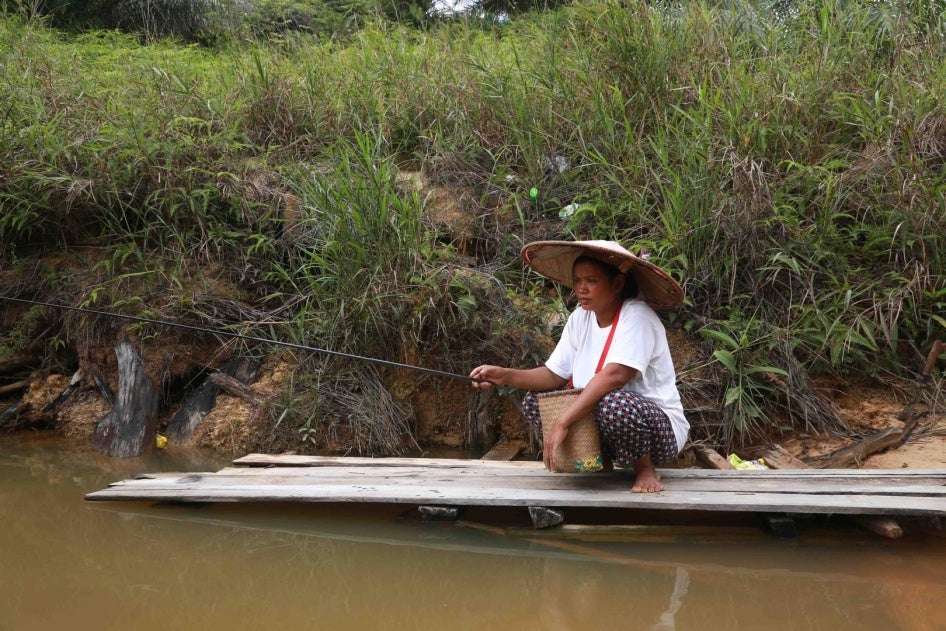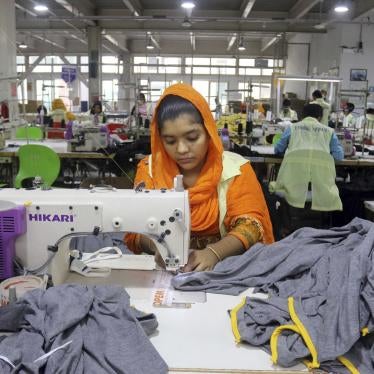On February 28, ambassadors from EU member states found that they didn’t have the majority needed to pass a law that would obligate some large companies to respect human rights and environmental standards throughout their supply chains. Following the discussion, Lara Wolters, the European Parliament’s rapporteur on the file, called out the “outrageous injustice of big business lobbies who tell their political leaders what to do, instead of the other way around.”
Talks among EU ambassadors are set to continue, but unless the governments of Germany, Italy, and France stop obstructing the adoption of the text, it will be impossible to reach the necessary majority in the EU’s voting system.
The proposed EU Corporate Sustainability Due Diligence Directive is critical to prevent and remedy corporate abuses in global supply chains. Human Rights Watch and many other organizations have consistently documented human rights and environmental abuses in the supply chains of companies across various sectors, including garments, minerals, and agricultural products. Violations include child labor, dangerous working conditions, poverty wages, land grabs, and deforestation.
The law has been in the making since 2020, gone through months of EU inter-institutional “trilogue” negotiations, and EU institutions agreed on a deal in December 2023.
However, over the last few weeks, fearmongering, misinformation, and deal-making have sought to derail the law in its final round of approval by EU ambassadors, undermining the EU’s legislative processes.
In January, Germany’s Free Democratic Party, the government’s junior coalition partner, withdrew support for the agreement, falsely claiming that the directive, which the German government had previously negotiated and approved, would unreasonably burden small and medium enterprises in high-risk sectors.
But only companies large enough to meet a combination of employee and revenue thresholds fall within the scope of the proposed law. The December 2023 draft law stated clearly that it would apply to companies with more than 500 employees with the exception of a narrow list of high-risk sectors for which the threshold was set at above 250 employees, combined with revenue turnover thresholds. By definition, small and medium enterprises in the EU have fewer than 250 employees and are outside the scope of the law. These small and medium-sized companies— 99 percent of all EU businesses—would not have any legal obligations. On the contrary, the law encourages EU governments to provide financial and other support that can benefit small and medium businesses.
The Free Democratic Party’s position is out of touch with its supporter base and many German businesses. German national civil society has vociferously protested, calling on Chancellor Olaf Scholz to rein in the party and support the due diligence directive. He has yet to do so even though large coalition parties—the Greens and Social Democratic Party— support the law.
In mid-February, reports of a shameful “deal” between German Finance Minister Christian Lindner, from the Free Democratic Party, and Italy emerged. Lindner, representing the German government, reportedly agreed to block a draft EU packaging regulation to appease Italy; in exchange Italy promised to block the due diligence directive.
In the last few days, France has also unexpectedly played a negative role, trying to limit the scope of the proposed law to companies with more than 5,000 employees. Manon Aubry, a French member of the Parliament from the left, noted that France’s proposal would exclude 98 percent of large companies.
Over 140 civil society organizations, including Human Rights Watch, have urged EU governments to stick to the key principles agreed in December 2023 and move forward on the law. Doing so is critical to level the playing field for large companies and move beyond relying on voluntary corporate action.
There’s growing evidence that voluntary corporate responsibility efforts are not enough. A February 2024 publication by academics at the Said Business School of the University of Oxford, the New York University Stern School of Business and GlobeScan, a strategy consultancy—based on a global survey with 234 respondents from companies across sectors—found that companies are not attaching high value to “managing risks, from climate change risks, including a disrupted supply chain, to legal risks for non-compliance.”
Many corporations of all sizes and business associations from across the European Union have publicly supported the directive. Having a strong EU-wide due diligence law will limit the fragmentation of the legal landscape and instead help individual member states pursue national-level legislation with the benefit of common definitions and features.
The governments of Germany, France, and Italy should stop the misinformation, fear mongering, and efforts to block the due diligence law that serve to promote only narrow corporate interests, disregarding the support by other businesses and business associations.
France should support the due diligence directive without diluting it and persuade Italy and Germany to follow. Delivering on a strong due diligence law is crucial to signal that the EU will stand with victims of corporate abuses in their fight for justice.









